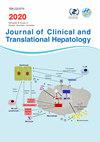Hepatocellular Carcinoma with Gastric Metastasis Mimicking a 4 cm Gastrointestinal Stromal Tumor After a 3-year Disease-free Interval
IF 3.1
3区 医学
Q2 GASTROENTEROLOGY & HEPATOLOGY
引用次数: 0
Abstract
Hepatocellular carcinoma (HCC) is an aggressive tumor that usually occurs in patients with chronic liver disease and cirrhosis. Surgical resection is an optimal treatment for HCC, but the 5-year recurrence rates are significantly high. The majority of recurrent HCCs occur through intrahepatic metastasis with local tumor progression, and less than 20% of recurrences are extrahepatic metastases. HCC with gastric metastasis is extremely rare, and it is easily misdiagnosed as primary gastric cancer with liver metastasis. An 80-year-old male chronic hepatitis B virus carrier had received lamivudine and entecavir for years and was regularly followed up in the clinic. He had a 3.5 cm solitary HCC with microvascular invasion and received curative surgical resection in 2009. In 2013, he developed a 1.3 cm solitary HCC again and was treated with combination therapy with radiofrequency ablation and pure ethanol injection. Afterwards, he was followed every 3–6 months and was HCC-free. Three years later, in 2016, endoscopy for intermittent epigastralgia showed a solitary 4 cm intraluminal gastric subepithelial tumor without mucosal ulcers or erosions over the gastric fundus. All imaging studies, including computed tomography, favored the diagnosis of gastrointestinal stromal tumor (GIST), but the pathology of the tumor proved to be HCC. The patient did not receive any systemic anticancer therapy but only wedge resection of the stomach and remained tumor- and HCC-free until his latest clinic visit in 2023. The current case is unique and indicates the possibility of HCC with late solitary gastric metastasis mimicking GIST. Complete gastric tumor resection ensured an extremely good outcome for the patient, which is different from the devastating prognosis of most cases of HCC with gastric metastasis.3年无病间隔后,肝细胞癌伴胃转移模拟4厘米胃肠道间质瘤
肝细胞癌(HCC)是一种侵袭性肿瘤,常见于慢性肝病和肝硬化患者。手术切除是HCC的最佳治疗方法,但5年复发率明显较高。大多数hcc复发发生在局部肿瘤进展的肝内转移,不到20%的复发是肝外转移。HCC合并胃转移极为罕见,容易误诊为原发性胃癌合并肝转移。一位80岁男性慢性乙型肝炎病毒携带者接受拉米夫定和恩替卡韦治疗多年,并定期在临床随访。他患有3.5厘米单发肝细胞癌并伴有微血管侵犯,于2009年接受了根治性手术切除。2013年再次发生1.3 cm孤立性HCC,接受射频消融+纯乙醇注射联合治疗。此后每3-6个月随访一次,无hcc。三年后的2016年,间歇性胃脘痛的内镜检查显示一个孤立的4厘米的胃腔内上皮下肿瘤,未见粘膜溃疡或胃底糜烂。所有影像学研究,包括计算机断层扫描,都倾向于胃肠道间质瘤(GIST)的诊断,但肿瘤病理证实为HCC。该患者没有接受任何全身抗癌治疗,只接受了胃楔形切除术,直到2023年的最后一次门诊就诊,他都没有肿瘤和hcc。本病例是独特的,提示肝癌伴晚期孤立性胃转移的可能性。完全切除胃肿瘤可确保患者获得极好的预后,这与大多数肝细胞癌伴胃转移的灾难性预后不同。
本文章由计算机程序翻译,如有差异,请以英文原文为准。
求助全文
约1分钟内获得全文
求助全文
来源期刊

Journal of Clinical and Translational Hepatology
GASTROENTEROLOGY & HEPATOLOGY-
CiteScore
6.40
自引率
2.80%
发文量
496
 求助内容:
求助内容: 应助结果提醒方式:
应助结果提醒方式:


